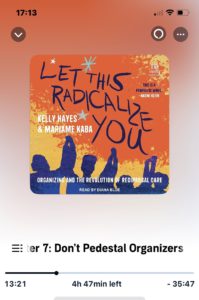Lately, on my runs, I’ve been listening to the audio version of a book called Let This Radicalize You, by Kelly Hayes and Mariame Kaba. It’s about organising movements and creating communities of care, especially within a system that is designed to destroy empathy and normalise the injury and death of those who are considered inferior and otherwise dispensable.
An interesting chapter is about the dangers of putting organisers on pedestals – both to the people themselves, who may become ensnared and co-opted by celebrity culture, and to the movements they are working with, which may become splintered and damaged by the attention being paid to individuals.
To quote the book (p 130), “It is dehumanizing to pedestal people in this way …. it erases the wholeness of their being, papering over the truth of their life, work and beliefs with fantasy and adulation. It also sets people up to be dismissed or widely condemned when they are inevitably wrong about something, because those moments will always come, for all of us … as organizers, we are always learning, and we don’t know what we don’t know. This never ceases to be true, however accomplished and admired someone might become.”
I was really struck by the last couple of sentences. It is true that we don’t know what we don’t know, and as leaders, the beginning of our downfall comes when we forget that. As soon as we become convinced that we know what we are doing and that it is our way or the highway, we are at the beginning of the end of our success in whatever movement we are trying to support or create.
I’m not suggesting that we should be so lacking in self-confidence or belief in our own competence that we are paralysed by indecision. Part of a leader’s job is to make decisions, and to be able to defend them as required. But it is important to listen to those around us who may see things we don’t – especially when we don’t like what they are saying. We may decide to take their opinions under advisement and keep moving on the trajectory we have set, but it’s important to be aware that, as Kelly and Mariame put it so succinctly, we don’t know what we don’t know. We have to listen to those who might know some things better than we do.
I have long felt that the root of wisdom is knowing whom to ask – and sometimes the person who knows the answer might be a 5 year old child, or a person of lesser education or prestige. We should never allow ourselves to be blinded by our own arrogance and prejudice to the point of missing out on important information, because we just don’t know what we don’t know.
To quote the Talmud (Ta’anit 7a), the great Rabbi Haninah said, “I have learned a lot from my teachers, and even more from my friends. But from my students I have learned the most.”
Remember – we don’t know what we don’t know, but somebody else probably does. Listen.

